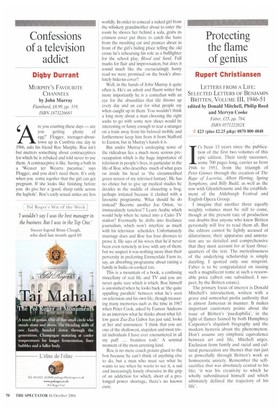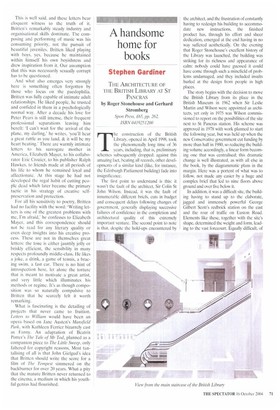Protecting the flame of genius
Rupert Christiansen
LE I TERS FROM A LIFE: SELECTED LETTERS OF BENJAMIN BRITTEN, VOLUME 111, 1946-51 edited by Donald Mitchell, Philip Reed and Mervyn Cooke Faber, ,f25, pp. 784, ISBN 057122282X D £23 (plus £2.25 p&p) 0870 800 4848 It's been 13 years since the publication of the first two volumes of this epic edition. Their tardy successor, some 700 pages long, carries us from 1946 to 1951, from the triumph of Peter Grimes through the creation of The Rape of Lucretia, Albert Herring, Spring Symphony, and Billy Budd, as well as the row with Glyndebourne and the establishment of the Aldeburgh Festival and English Opera Group.
I imagine that another three equally weighty volumes must be still to come, though at the present rate of production one doubts that anyone who knew Britten personally will live to read them all. But the editors cannot be lightly accused of dilatoriness; their apparatus and annotation are so detailed and comprehensive that they must account for at least threequarters of the text. The meticulousness of the underlying scholarship is simply dazzling. I spotted only one misprint. Faber is to be congratulated on issuing such a magnificent tome at such a reasonable price (albeit one subsidised, I suspect, by the Britten estate),
The primary focus of interest is Donald Mitchell's introduction, written with a grave and somewhat prolix authority that is almost Jamesian in manner. It makes important cautionary points about the issue of Britten's 'paedophilia', ' in the light of flames fanned by both Humphrey Carpenter's slapdash biography and the modern hysteria about the phenomenon. Don't assume any simplistic equivalence between art and life, Mitchell urges. Exclusion from family and racial and cultural persecution are themes that run just as powerfully through Britten's work as homoerotic anxiety. Remember the selfsacrifice that was absolutely central to his life; 'it was his creativity to which he wholly subordinated himself and which ultimately defined the trajectory of his life'. This is well said, and these letters bear eloquent witness to the truth of it. Britten's remarkably steady industry and organisational skills dominate. The composing and performing of music was his consuming priority, not the pursuit of beautiful juveniles. Britten liked playing with boys, yes, because he maintained within himself his own boyishness and drew inspiration from it. Our assumption that this was necessarily sexually corrupt has to be questioned.
And what also emerges very strongly here is something often forgotten by those who focus on the paedophilia. Britten was fully capable of intimate adult relationships. He liked people, he trusted and confided in them in a psychologically normal way. After a decade his love for Peter Pears is still intense, their frequent professional separations leaving him bereft: 'I can't wait for the arrival of the plane, my darling,' he writes, 'you'll hear a great rattle as you land, & it will be my heart beating.' There are warmly intimate letters to his surrogate mother in America, Elizabeth Mayer, to his collaborator Eric Crozier, to his publisher Ralph Hawkes, to friends made at all periods of his life to whom he remained loyal and affectionate. At this stage he had not developed the regal habit of cutting people dead which later became the primary tactic in his strategy of creative selfpreservation and protection.
For all his sensitivity to poetry, Britten had no facility with the word: 'Writing letters is one of the greatest problems with me, I'm afraid,' he confesses to Elizabeth Mayer, and this correspondence should not be read for any literary quality or even deep insights into his creative process. These are not in themselves great letters: the tone is either jauntily jolly or briskly efficient, the sensibility in many respects profoundly middle-class. He likes a joke, a drink, a game of tennis, a bracing swim, a fast car. There is no hint of introspection here, let alone the torture that is meant to motivate a great artist, and very little which illuminates his methods or regime. It's as though composition was so naturally compulsive to Britten that he scarcely felt it worth remarking.
What is fascinating is the detailing of projects that never came to fruition. Letters to William would have been an opera based on Jane Austen's Mansfield Park, with Kathleen Ferrier bizarrely cast as Fanny. An adaptation of Beatrix Potter's The Tale of Mr Tod, planned as a companion piece to The Little Sweep, only faltered for copyright reasons, Most tantalising of all is that John Gielgud's idea that Britten should write the score for a film of The Tempest simmered on the backburner for over 20 years. What a pity that the mature Britten never returned to the cinema, a medium in which his youthful genius had flourished.











































































































 Previous page
Previous page